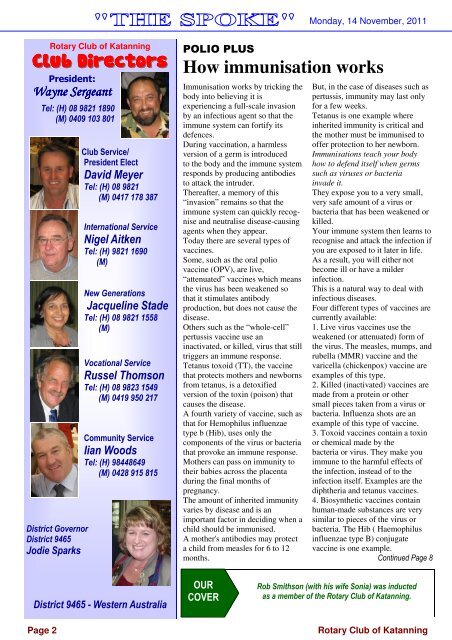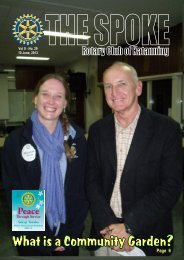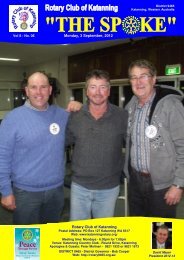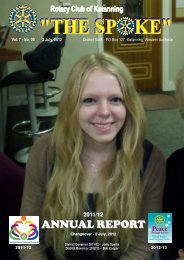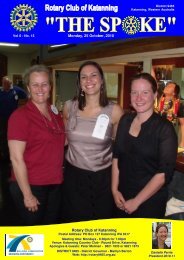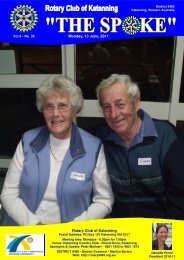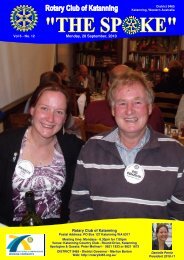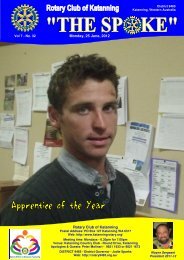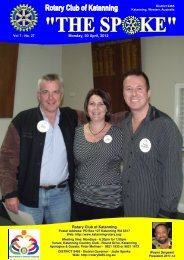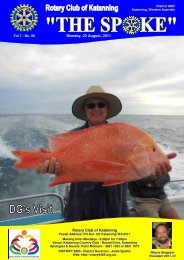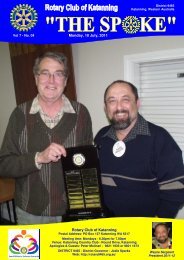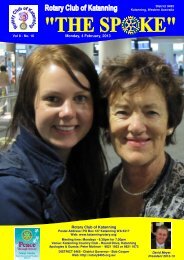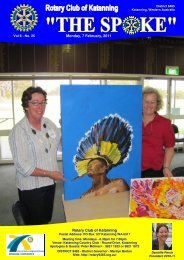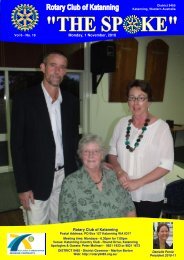Vol 7-18-Nov 14 - Katanning Rotary Club
Vol 7-18-Nov 14 - Katanning Rotary Club
Vol 7-18-Nov 14 - Katanning Rotary Club
Create successful ePaper yourself
Turn your PDF publications into a flip-book with our unique Google optimized e-Paper software.
Monday, <strong>14</strong> <strong>Nov</strong>ember, 2011<strong>Rotary</strong> <strong>Club</strong> of <strong>Katanning</strong><strong>Club</strong> DirectorsPresident:Wayne SergeantTel: (H) 08 9821 <strong>18</strong>90(M) 0409 103 801District GovernorDistrict 9465Jodie Sparks<strong>Club</strong> Service/President ElectDavid MeyerTel: (H) 08 9821(M) 0417 178 387International ServiceNigel AitkenTel: (H) 9821 1690(M)New GenerationsJacqueline StadeTel: (H) 08 9821 1558(M)Vocational ServiceRussel ThomsonTel: (H) 08 9823 1549(M) 0419 950 217Community ServiceIian WoodsTel: (H) 98448649(M) 0428 915 815POLIO PLUSHow immunisation worksImmunisation works by tricking thebody into believing it isexperiencing a full-scale invasionby an infectious agent so that theimmune system can fortify itsdefences.During vaccination, a harmlessversion of a germ is introducedto the body and the immune systemresponds by producing antibodiesto attack the intruder.Thereafter, a memory of this“invasion” remains so that theimmune system can quickly recogniseand neutralise disease-causingagents when they appear.Today there are several types ofvaccines.Some, such as the oral poliovaccine (OPV), are live,“attenuated” vaccines which meansthe virus has been weakened sothat it stimulates antibodyproduction, but does not cause thedisease.Others such as the “whole-cell”pertussis vaccine use aninactivated, or killed, virus that stilltriggers an immune response.Tetanus toxoid (TT), the vaccinethat protects mothers and newbornsfrom tetanus, is a detoxifiedversion of the toxin (poison) thatcauses the disease.A fourth variety of vaccine, such asthat for Hemophilus influenzaetype b (Hib), uses only thecomponents of the virus or bacteriathat provoke an immune response.Mothers can pass on immunity totheir babies across the placentaduring the final months ofpregnancy.The amount of inherited immunityvaries by disease and is animportant factor in deciding when achild should be immunised.A mother's antibodies may protecta child from measles for 6 to 12months.But, in the case of diseases such aspertussis, immunity may last onlyfor a few weeks.Tetanus is one example whereinherited immunity is critical andthe mother must be immunised tooffer protection to her newborn.Immunisations teach your bodyhow to defend itself when germssuch as viruses or bacteriainvade it.They expose you to a very small,very safe amount of a virus orbacteria that has been weakened orkilled.Your immune system then learns torecognise and attack the infection ifyou are exposed to it later in life.As a result, you will either notbecome ill or have a milderinfection.This is a natural way to deal withinfectious diseases.Four different types of vaccines arecurrently available:1. Live virus vaccines use theweakened (or attenuated) form ofthe virus. The measles, mumps, andrubella (MMR) vaccine and thevaricella (chickenpox) vaccine areexamples of this type.2. Killed (inactivated) vaccines aremade from a protein or othersmall pieces taken from a virus orbacteria. Influenza shots are anexample of this type of vaccine.3. Toxoid vaccines contain a toxinor chemical made by thebacteria or virus. They make youimmune to the harmful effects ofthe infection, instead of to theinfection itself. Examples are thediphtheria and tetanus vaccines.4. Biosynthetic vaccines containhuman-made substances are verysimilar to pieces of the virus orbacteria. The Hib ( Haemophilusinfluenzae type B) conjugatevaccine is one example.Continued Page 8District 9465 - Western AustraliaPage 2OURCOVERRob Smithson (with his wife Sonia) was inductedas a member of the <strong>Rotary</strong> <strong>Club</strong> of <strong>Katanning</strong>.<strong>Rotary</strong> <strong>Club</strong> of <strong>Katanning</strong>


